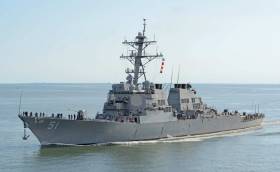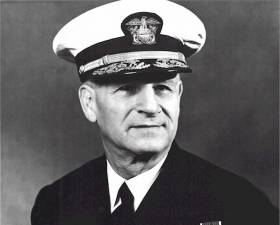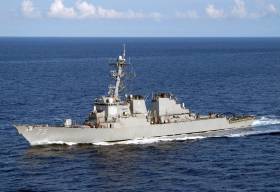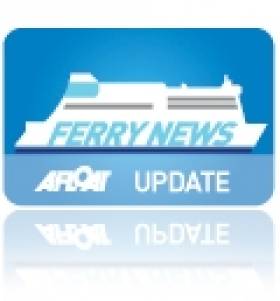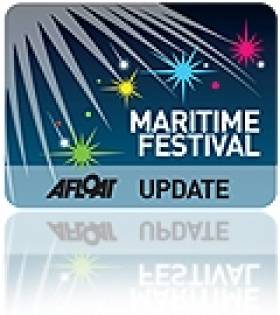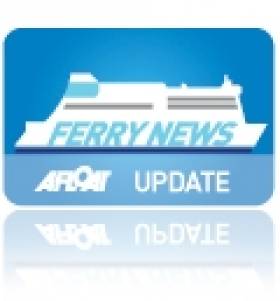Displaying items by tag: US Navy
US Navy Amphibious Vessel Visits Dublin Port in Advance of American College Football Match
A naval visitor arrived to Dublin Port this afternoon as the USS Mesa Verde is on a courtesy call to the capital to coincide with an American football match classic which is to be held tomorrow, Saturday.
The United States Navy USS Mesa Verde is a San Antonio-class amphibious transport dock vessel which had departed Narvik, Norway following what is understood to be training exercises held with their NATO Nordic ally.
Upon arrival to Dublin port’s fairway, tugs approached the naval vessel to the Deepwater Berth on the south quays.
Attending the USS Mesa Verde, Afloat noted the tugs Beaufort at the bow whereas Shackleton and Giano were on duty off the stern of the large naval vessel which docked at Berth 46. This part of the port is a restricted operational area and where such larger naval visitors berth.
USS Mesa Verde is visiting Dublin Port ahead of the 2023 Aer Lingus College Football Classic between Navy Midshipmen and the Notre Dame Fighting Irish. Up to 40,000 spectators are expected at the Aviva Stadium on Lansdowne Road including crew and marines of the 699 personnel of the foreign naval vessel.
In addition to tomorrow evening's sporting event in Ballsbridge, US military aircraft will be making a flyover above the capital.
Prior to the vessel’s arrival, the Naval Service OPV90 /P60 series leadship, L.E. Samuel Beckett had this morning berthed upriver at Sir John Rogerson's Quay.
The L.E. Samuel Beckett is one of just two operational patrol vessels of the Naval Service will be making a shorter call in the capital whereas the USS Mesa Verde is to remain until Tuesday morning.
The US Navy is set to name a new vessel after a Mayo man who served in the Vietnam War, as TheJournal.ie reports.
Patrick Gallagher emigrated from Ballyhaunis to the United States in 1962, joining the Marine Corps four years later as President Lyndon B Johnson escalated the American presence in Vietnam.
Lance Corporal Gallagher was killed in action in March 1967, less than a year after he was awarded the Navy Cross for his quick actions in saving fellow marines from a grenade attack.
Now the USS Gallagher, an Arleigh Burke-class destroyer, will carry the name of a man described as “an American hero”. TheJournal.ie has more on the story HERE.
#CorkHarbour - Tom MacSweeney writes on Afloat.ie today about the centenary of the US Navy’s arrival in Cork Harbour during the First World War.
But the event has a living connection, as the Irish Examiner reports, with the great-granddaughter of the flotilla commander attending this morning’s ceremony in Cobh to unveil a commemorative plaque.
Lizzie Helmer, an exchange student at UCC, only learned the week before she left her California home for Cork that her great-grandfather Joseph Taussig was in charge of the fleet that helped secure the southern approaches to Ireland during the Great War.
Helmer’s family paid a visit to Cobh last month to learn more about their connection with the harbour town formerly known as Queenstown.
And they were joined by UCC president Prof Patrick O’Shea, whose own grand-uncle lost his life when the SS Lismore was torpedoed off Le Havre, just three weeks before the Americans arrived in Cork Harbour.
The Irish Examiner has much more on the story HERE.
US Navy Sailor In Garda Custody Over Sexual Assault Claim
#Crime - A US naval officer is in Garda custody over an alleged sexual assault in a Dublin hotel, as Navy Times reports.
A spokesperson for the US Embassy confirmed that the alleged incident was reported on Wednesday 22 March while the USS Donald Cook, a destroyer based in southern Spain, was on a scheduled liberty visit to Cobh in Cork Harbour.
The sailor in question has not been charged and it is expected that the US will formally request Irish authorities to relinquish jurisdiction for the US Navy to pursue the matter internally.
Navy Times has more on the story HERE.
Stars & Stripes Flown From Fast-Ferry as IOM Steam Packet Mark Retirement of US Navy Captain
#ShipStarStripes – The Isle of Man Steam Packet Company fast-ferry Manannan which resumed seasonal Liverpool-Douglas sailings recently, flew a United States of America flag to mark the retirement of Captain Thomas Shaw, who commanded the vessel during her time with the US Navy.
Captain Shaw officially retires in June after 27 years' military service, and the Steam Packet Company agreed to recognise his service with Manannan – known as USS Joint Venture during his command – after being approached by Commander Robert Stover.
Commander Stover, Director of Engineering with the Afloat Training Group in San Diego, said: 'The significance for Captain Shaw will be that the Steam Packet Company graciously took the effort to recognise his transition from the military service.
As previously reported by Afloat.ie in 2011, the 5,029grt craft was used for various trials and demonstrations and in which saw service in the Persian Gulf in support of 'Operation Iraqi Freedom' and in 2003 'Operation Enduring Freedom' in the Horn of Africa.
Wexford Festival to Celebrate Founder of US Navy
#WEXFORD MARITIME FESTIVAL - The John Barry Maritime Festival as previously reported is to take place on the weekend of 23-24 June where a packed festival programme outlines various activities and events, writes Jehan Ashmore.
As the festival is named after the Wexford-born Commodore John Barry, the father of the US Navy, there will be a contingent representing the navy who are to visit the festival. At the end of the festival one of the highlights will be the annual John Barry Memorial Ceremony. This is to be officiated by Major of Wexford Davy Hynes and attended by international dignitaries.
Throughout the festive weekend, the coastal town which is synonymous with its fleet of colourful dredging trawlers lining the quays will celebrate its rich maritime culture and heritage.
Wexford Harbour will be a visual array of boats and an air-sea rescue display by the Irish Coastguard (noting new SAR helicopter) and RNLI lifeboat and Naval Service. Also on hand will be the Irish Whale and Dolphin Group which will have a stand and Met Eireann will also be on the quay providing information and demonstrations to the public on marine safety.
Among the events to be staged is a rowing regatta of traditional sailing cots to modern fibre glass rowing boats, sea kayaking, canoeing, sailing and raft races on view from Wexford Quay marina.
In addition a 26,000 sq ft exhibition centre will house over 100 handcrafted model boats. There will be exhibitions about John Barry, the Titanic and an interactive media exhibition of maritime activities and local artists and photographers.
There will be entertainment in the form of traditional Irish music, dance groups, evening music on the Saturday and Wexford traders will be showcasing local produce on the quay. To consult the festival programme including fringe events visit www.johnbarrymaritimefestival.com
American Sailor Hopes to Find Lost Irish Love
#NEWS UPDATE - More than three decades after their whirlwind romance, an American sailor is trying to reconnect with his long-lost Irish love.
As World Irish reports, Jarvis Boykin was on shore leave from the USS Mount Whitney when he he me the "gorgeous little strawberry blonde" at a nightclub in Dublin in 1976.
"We spent as much together as we could for those nine days that I was there," Boykin told the Mooney show on RTÉ Radio 1.
The pair exchanged letters for a time, but after the 1979 postal strike they lost touch, and Boykin later lost the woman's contact information.
But last week Boykin contacted Mooney from his home in North Carolina to appeal for anyone who can help in finding his lost love.
World Irish has more on the story HERE.
Former US Navy Fast-Craft Re-opens Seasonal Dublin Route
Manannan's chequered career included a five year charter initially to the United States Navy but transferred to the United States Army Forces between 2001-2006. The 5,029grt craft (see photo) was used for various trials and demonstrations and in which saw service in the Persian Gulf in support of 'Operation Iraqi Freedom' and in 2003 'Operation Enduring Freedom' in the Horn of Africa.
An engine plant of 4 x Caterpillars diesel generates a speed of over 40 knots / 46 mph which provided logistical solutions by the High-Speed Vessel (HSV) to transport troops and supplies covering long distances in support of the Combined Joint Task Force.
Other tasks required by the force included the roles of operating as a mobile command centre which entailed working closely inshore and operating as a helicopter carrier. Helicopters landed at the craft's stern positioned helicopter landing deck.
The military role of the craft is in stark contrast compared to when the 96m ferry was launched in 1998 for civilian purposes as the Incat 050, the number representing the number of pioneering wave-piercing craft built by InCat in Hobart, Tasmania.
Asides her military days the 800-passenger / 200 vehicle fast-ferry has served the Hobart-Melbourne route, between New Zealand's north and south island and in European waters in the Mediterrean and to the Canary Islands.
Manannan (see photo) entered service last May after the Isle of Man Steam Packet Company (IOMSPco) purchased the vessel which was laid-up in Hobart. She made the long delivery to the northern hemisphere and was re-converted for ferry usesage during a refit in Portsmouth.
The 181 year-old company is the only sea-based passenger operator to the island on services linking Dublin, Belfast, Heysham, Liverpool and (Birkenhead) in the winter months.
There are rival companies such as the Ramsey Steamship Company but they are freight-only operators mostly running to Belfast and Liverpool using short-sea coastal traders and to other small Irish Sea ports.
An annual round island cruise is held and like last year the Manannan will be serving the cruise on Sunday 1 May departing Douglas at 11am for a journey of around 2 hours. The route closely circumnavigates the spectacular Manx coastline. For information on the island cruise and fares click here.



























